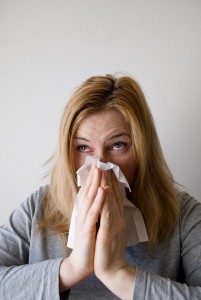Surprise! You Have New Allergies!
Wow, you may be thinking, How on Earth did that happen? You were fine with pollen/cats/shellfish all your life, and now they’re a huge problem. You’re not alone. Lots of people develop new allergies in adulthood; indeed, throughout the entire course of their lives. You’re just never too old to develop an adverse reaction to something in your environment.
Many people think that allergies are something you develop as a child and potentially grow out of, which does happen in some cases. However, it would seem there are a couple of age thresholds that appear to correlate with new allergies. The first happens around ages 30-40; the second around 50-60. Sheer matter of fact: as you age, your immune system does, too. It becomes less efficient and more erratic. In addition, it can sometimes causes problems.
Allergies develop when an ordinarily nondescript stimulus suddenly provokes an out-of-proportion reaction from your body. This has a whole spectrum of reactions and severity. This can be anywhere from red eyes and itchy throats to full-on anaphylaxis. The same common factor behind them all is your body trying to protect you. Something has changed, so your immune system ramps up its reactions in order to keep you alive. Or so it thinks.
Why Me? Why Now?
It’s frustrating to suddenly have new allergies thrust upon you. If you have hay fever, there are about 18 million people in the U.S. alone who share your woe. About 30% of adults have nasal allergies of some kind. At least we can share tissues. In general, though, doctors don’t know exactly how many adults develop first time allergies. Possibly because it’s always been an issue that the person was only minimally aware of. You could be one of those people who always gets a cold in late spring, and then, suddenly, your doctor puts a new spin on your runny nose.
It’s also a bit of a revelation to discover that the heavy sense of exhaustion you are feeling isn’t lack of sleep! It could be your allergies. As if it weren’t hard enough to function with on a day to day basis, finding out that an allergy is keeping you from getting proper rest is incredibly frustrating.
Some Theories
For years, people have discussed the sanitary environment theory as a possible reason why allergies are on an upswing. Due to the prevalence of chemical cleaners and the use of soap and water, there are just fewer truly noxious things for our immune systems to cut their teeth on. After a lifetime of living in a tidy and semi-sterile environment, your body overreacts to normal levels of environmental contaminants, like pet dander or ragweed. If you’re exposed to enough dirt as a child, your immune system has a better clue as to what may constitute a true threat.
Allergies can also pop up if you’re exposed to a new allergen while your body is in an altered or sub-optimal state of health, like pregnancy or illness. With your immune system weakened, ordinary stimulus turn into deadly dangers. Or daily irritations.
New things are also a source of allergies. If your body has been completely unexposed to a certain kind of environment, it would stand to reason that it has no way to read it as benign or noxious. Immune systems are touchy like that, and they typically overreact to the new stimulus. This can happen if you get a new pet, or if you move from one state or country to a different one. Change seems to be the common denominator here: what is unusual is bad.
So What Now?
The best you can do in these cases is to manage your symptoms. Dangerous allergies mean you read labels and avoid your problem substance, and carry an EpiPen in extreme cases. If they’re simply aggravating and irritating, avoidance is also good. There are countless brands of oral antihistamines that help decrease your symptoms and which allow you to function somewhat normally, despite your body’s innate reaction.
Look into Air Purifiers and Dehumidifiers for your home. They can help allay the worst of the allergy triggers, leaving you in relative peace at home. You may even want to bring a small portable air purifier into work, especially if you have a closed office that can become your sanctuary.
In all honesty, doctors really have no idea what triggers an allergy, and cannot accurately predict if someone will be born with or be susceptible to a particular family allergy. They can make some educated guesses, and have some hard evidence to back them up; but the human body is still a mystery.

